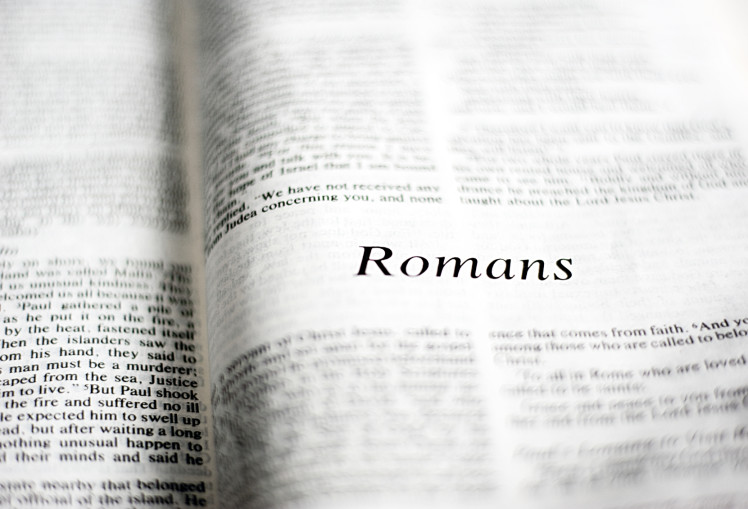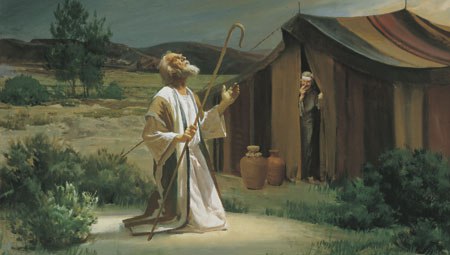Blog

Romans Bible Guide – Day Eleven
February 25, 2016
Previously, in Romans: Paul has introduced the notion that faith – specifically, trust in the value and relevance of Jesus’ life and death – is the key to a meaningful life and was at the center of all of God’s past involvement with the Jewish people.
Romans 4:1-12
4 What then are we to say was gained by Abraham, our ancestor according to the flesh? 2 For if Abraham was justified by works, he has something to boast about, but not before God. 3 For what does the scripture say? “Abraham believed God, and it was reckoned to him as righteousness.” 4 Now to one who works, wages are not reckoned as a gift but as something due. 5 But to one who without works trusts him who justifies the ungodly, such faith is reckoned as righteousness. 6 So also David speaks of the blessedness of those to whom God reckons righteousness apart from works:
7 “Blessed are those whose iniquities are forgiven,
and whose sins are covered;
8 blessed is the one against whom the Lord will not reckon sin.”
9 Is this blessedness, then, pronounced only on the circumcised, or also on the uncircumcised? We say, “Faith was reckoned to Abraham as righteousness.” 10 How then was it reckoned to him? Was it before or after he had been circumcised? It was not after, but before he was circumcised. 11 He received the sign of circumcision as a seal of the righteousness that he had by faith while he was still uncircumcised. The purpose was to make him the ancestor of all who believe without being circumcised and who thus have righteousness reckoned to them, 12 and likewise the ancestor of the circumcised who are not only circumcised but who also follow the example of the faith that our ancestor Abraham had before he was circumcised.

Points of Interest:
- ‘Abraham, our ancestor according to the flesh’ – Paul brings up Abraham, as both a case study in the value of faith and also the relative insignificance of anything else that we might think makes us better than others. It’s interesting to me that Paul assumes the Romans would be interested in this story. After all, while he and some of the Jesus followers in the house churches are Jewish, most were not. Today, Abraham is a founding father-figure to Christians, Jews, and Muslims – roughly half the world’s population – but then he was only a central figure for Jews. Yet Paul insists that his story, his experience, and his example are important for all people.If I’m not Jewish, this is humbling. It tells me that the start of God’s story for me isn’t in my life, or that of my grandparents, or in America, or in the European Enlightenment, or in anything else that was accomplished by or happened to my ancestors. God’s story for me is “to the Jew first.” (1:16) If I were Jewish, it would also be humbling, because it means that Abraham and his legacy are not my special possession, that all along this story was for everyone. It is “also to the Greek.” (1:16)
- ‘Abraham believed God, and it was reckoned to him as righteousness.’ – This line is from Genesis 15. Abraham thinks God has promised to do something great for the whole earth through his descendants. Yet his wife Sarai and he are getting older, and they don’t yet have a single child. God tells Abraham he will get that child and a gazillion descendants through which this promise will come true. Abraham says, “OK. I trust you, God.” And God calls that righteousness. That is what it means to be in right relationship with oneself and with God. It’s not to try to accumulate payment, whether through moral goodness or human status, but to trust God’s provision. Paul says this is the pattern for all human dealings with God – it’s what it means to be in the game, to trust what God is doing to make our lives meaningful, to make us part of a bigger story and community, and to set right all the earth.
- ‘who justifies the ungodly’ – Paul slips in this little phrase to talk about what God did for Abraham. Calling Abraham ungodly would be a pretty big surprise for Paul’s fellow Jews, but Paul is sticking to his agenda of equal footing for all humanity. We are all part of that story Paul tells at the end of chapter one, tending toward a lack of trust in God and making life difficult for ourselves and one another. Put differently, we have all “sinned and fallen short of the glory of God.” (3:23) Abraham, the Jews, the Romans, you, and I were made to be tight with God and experience all of God’s goodness and joy and light and power. Yet for all us, that is consistently not true. Our only way back is to trust God to make it so.
- ‘Blessed are those whose iniquities…’ – Paul brings another Jewish hero into the conversation, this time King David again, from Psalm 32. With David, too, the good life came from trusting God to make things right, not from any way he had to make that so. There’s that word “reckon” again, God counting faith for us, but not counting all our faithlessness against us.
- ‘pronounced only on the circumcised…?’ – Abraham had faith and became an example for relating to God before he was circumcised and long before God gave people any law to follow. Thus circumcision was only a sign of something for a time, not the thing itself. Yet for Paul’s contemporaries, to be circumcised was to be a Jew. To not be circumcised was to be an outsider to the experience, ineligible, inferior.Paul is really going after that value of human achievements and identity markers here. He has the humility here to go after that of his own culture first. Presumably this would apply, though, to anything else we think is the key to the good life. For Romans, it might have been status as Roman citizens. Interestingly enough, Paul had that status (unusual for a first century Palestinian Jew), but doesn’t bring it up in this letter. It’s just that big a deal. I think Paul would say the same thing about graduate degrees, social media followers, high incomes, fit bodies, getting married or having children, and more. If these things make sense as part of the life God’s leading you to, go for it, but they are not prerequisites. They are not keys to the good life; faith is.
Taking It Home:
For you – Is there an equivalent identity marker to circumcision in your life? Something you have considered essential to the good life, whether you have it yet or don’t? Try telling God you’d like to hold that thing more lightly and trust God to give you a relationship to God and to your own life that makes things right.
For your church/city – Pray that our church would provide another witness, like Abraham and David, to the reality that trusting God brings joy and love and the good life.

